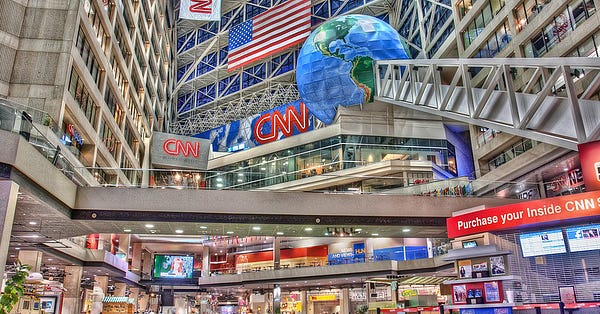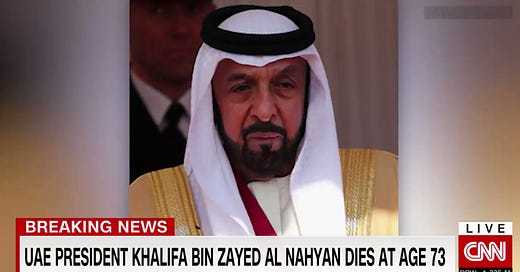CNN Runs Glowing Hagiography of UAE Dictator After His Death. Will the Network Ever Disclose How Much It’s Being Paid by the UAE?
CNN’s cartoonishly positive coverage of UAE, an absolute dictatorship that disappears journalists, was on full display again after the death of its nominal leader.
Will CNN ever respond to criticism over the fact that it’s clearly running paid-for commercials for the absolute dictatorship United Arab Emirates?
The Column detailed last September how CNN was running undisclosed P.R. fluff for the UAE. CNN did not, at the time, respond to our request for comment. Nor did it respond to requests for comment by Responsible Statecraft or the over a dozen human rights groups that asked the outlet to explain its relationship with UAE last fall. After last week’s death of nominal UAE ruler Khalifa bin Zayed Al Nahyan, media consumers were given another occasion to witness the puffery, this time about how the late “president” was a “modernizing,” “bold” leader. (The de facto ruler since bin Zayed Al Nahyan had a stroke in 2014 has been his half brother, Zayed bin Sultan Al Nahyan.)
We cannot embed the CNN video by Becky Anderson below because substack’s video embedding system is horrible, but you can watch it here. Please do, in its entirety.
No mention of UAE’s long-documented record of human rights abuses. No mention of the fact that the UAE is an absolute dictatorship with zero elections. No mention that the UAE has little rights for women and oppresses LBGTQ people. No mention of the journalists it has kidnapped and made disappear on trumped up charges. No use of “regime” or “dictatorship”—terms routinely used for countries that aren’t U.S. allies and don’t pay CNN for advertorial content. No mention of the UAE’s brutal, years-long bombing of poor Yemenis (the two-second mention of the war refers to it as “controversial”). No mention of the UAE’s close and oppressive relationship with even worse human rights abuser, Saudi Arabia. No mention of the UAE cracking down and imprisoning protestors during the Arab Spring. Just a three-and-a-half-minute glossy commercial for Khalifa bin Zayed Al Nahyan and UAE leadership that could have easily been produced by the UAE tourism bureau—if it wasn’t in reality.
Other recent advertorial reporting by CNN on UAE includes a segment on a “futuristic, dune-shaped building in the United Arab Emirates,” a story about the UAE “coming to the rescue” of the U.S. in response to Russia’s Ukraine invasion by increasing oil production, and a hard-hitting profile on a “luxury concierge'' who helps the super-rich plan their trips to Abu Dubai.
CNN pundits, personalities, and reporters routinely wax moralistic about human rights abuses in other countries. One is curious what their feelings are about their employer dedicating a nontrivial amount of its resources to doing undisclosed P.R. fluff for one of the world’s most oppressive and undemocratic governments. Thus far, since our initial report last September, no one at CNN has responded to questions about the outlet’s relationship with the UAE, likely because this substack is presumably not important enough to garner attention. Neither, apparently, is Responsible Statecraft, or the dozen human rights groups that wrote CNN an open letter, or even the Incredible Hulk himself:


Eight months on, perhaps someone at a more prominent outlet can ask CNN or those who work at CNN to comment on the network’s glaring puffery for the gulf dictatorship. How much money does the government of UAE or related entities pay the outlet for the constant stream of marketing copy for the regime? How much did CNN receive to be the “official broadcaster for “Expo 2020 Dubai” last year? What is the editorial oversight of its Middle East reporting? Any transparency into the relationship would go a long way toward restoring a modicum of credibility to the network.



